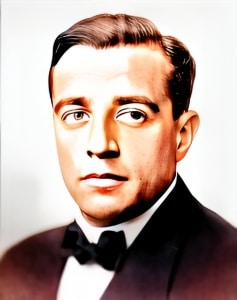 Frank Butler (1887-1967) was an American screenwriter and director who made significant contributions to the world of entertainment during the early and mid-20th century.
Frank Butler (1887-1967) was an American screenwriter and director who made significant contributions to the world of entertainment during the early and mid-20th century.
Born on July 28, 1887, in Oxford, North Carolina, Butler’s career was marked by his versatility as a writer and his ability to work on a wide range of film genres.
Frank Butler’s early career began in the world of vaudeville, a popular form of live entertainment during the early 20th century. His experiences in vaudeville provided a solid foundation for his future work in the entertainment industry, allowing him to understand the dynamics of live performances and connect with audiences.
As the film industry was on the rise, Butler transitioned from the stage to the screen, bringing his understanding of humor and entertainment with him. He made a name for himself as a screenwriter, contributing to the success of numerous films during the silent and early sound film eras.
One of his early notable writing credits was for the 1921 silent film “A Connecticut Yankee in King Arthur’s Court,” a comedy-fantasy film adapted from Mark Twain’s novel. The film was well-received, and Butler’s comedic touch was evident in the adaptation.
In 1928, Butler co-wrote the script for the comedy film “So This Is College,” directed by Sam Wood. The film showcased his ability to infuse humor into the narrative, and it remains a noteworthy example of his early work.
Frank Butler’s talents were not limited to comedy; he also wrote screenplays for various genres. In the 1930s, he co-wrote the screenplay for “I Am a Fugitive from a Chain Gang” (1932), a drama directed by Mervyn LeRoy. The film, based on a true story, was a critical and commercial success, highlighting Butler’s ability to contribute to serious and thought-provoking narratives.
During the 1940s, Butler’s career as a screenwriter reached new heights when he co-wrote the script for the classic romantic comedy “It’s a Wonderful Life” (1946), directed by Frank Capra. The film, starring James Stewart and Donna Reed, has since become a beloved holiday classic and is celebrated for its heartwarming message and timeless appeal. Frank Butler’s involvement in crafting the film’s story and dialogue was instrumental in its enduring success.
In addition to his screenwriting work, Frank Butler also ventured into directing. He directed films such as “Sail a Crooked Ship” (1961) and “Marriage on the Rocks” (1965), showcasing his ability to helm films with humor and style.
Throughout his career, Frank Butler demonstrated adaptability and a knack for crafting engaging and memorable stories. He contributed to various genres, leaving a lasting mark on the entertainment industry through his writing and directorial work.
Frank Butler’s career spanned several decades, and his contributions to the world of film continue to be celebrated and appreciated by audiences worldwide. His versatile talents in comedy, drama, and romance are a testament to his enduring influence in the history of American cinema. Frank Butler passed away on June 15, 1967, leaving behind a legacy of memorable films and timeless storytelling.
Loading live eBay listings...




